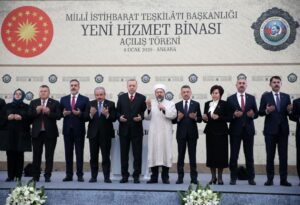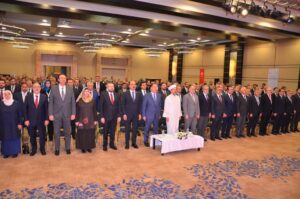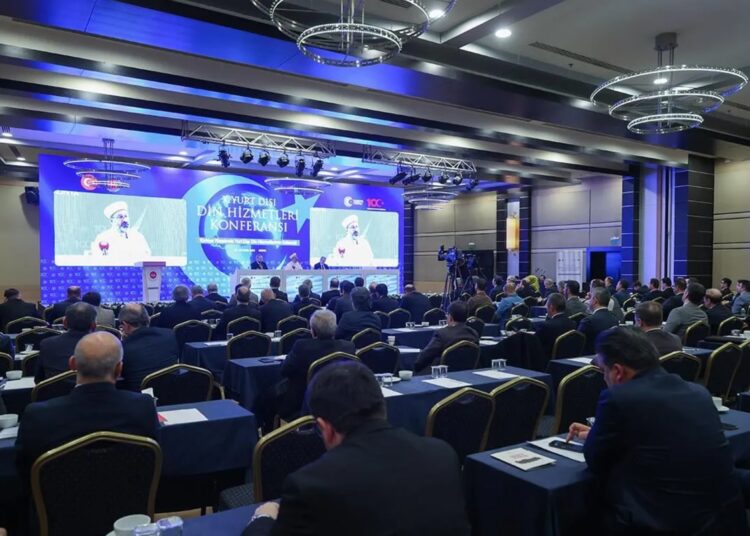Abdullah Bozkurt/Stockholm
Turkish intelligence has intensified its program of enlisting imams who were deployed to serve abroad as assets to gather information and collect intelligence in host countries, Nordic Monitor has learned.
According to a secret program, imams assigned to serve in overseas mosques, embassies and consulates undergo training programs on gathering information about targets without alerting authorities in host countries.
The program is jointly coordinated by Turkey’s main intelligence agency (Milli İstihbarat Teşkilatı, MIT), the foreign ministry’s covert unit, the Intelligence and Research Directorate (known as İstihbarat ve Güvenlik İşleri Genel Müdürlüğü in Turkish) and the government’s Religious Affairs Directorate (Diyanet).
Candidates selected for such missions undergo careful vetting by a government interagency committee after their names are put forward by the Diyanet. They are informed that these missions are in full compliance with Turkey’s national security interests and are part of a strategy to globally defend Islam against its enemies, primarily in the West.
The program, originally targeting Europe and North America due to the large Turkish Muslim diaspora communities in these regions, has recently been expanded to include countries in Asia, Africa and Latin America.
The last coordination meeting for this secret program took place on the sidelines of the 10th Overseas Religious Services Conference, held at the five-star Dedeman hotel in the conservative province of Konya from November 27 to 29, 2023. The conference was attended by approximately 250 embassy advisors, attachés and coordinators serving abroad as well as agents from the intelligence agency.

Speaking at the public segment of the meeting, Ali Erbaş, president of the Diyanet, explained the overarching goal for imams assigned by the government to serve abroad. He said overseas religious services would be evaluated during the three-day meeting and that extensive consultations would be conducted to identify new work areas and strategies in response to the opportunities and challenges encountered by Turkish imams.
“All our representatives should closely monitor developments in the countries they are stationed in and, considering that every problem is also an opportunity, they should work on generating strategic solutions,” he said.
Erbaş also addressed measures taken by host countries to hinder Turkish imams from fulfilling their objectives, saying, “Particularly through regulations, certain restrictions are being imposed, as seen in the examples of France and Austria. These restrictions have a detrimental effect on our overseas religious services. It is predicted that such pressures will increase, particularly with the rise to power of far-right parties. In order to be prepared for these pressures and to take the necessary precautions, strategic preparations should be made and concrete action plans should be developed.”
He urged overseas representatives to identify the challenges in their respective countries and formulate solutions based on a thorough understanding of the situation and strategic planning.
Application criteria for the International Seminary Program (Uluslararası Ilahiyat Programı, UIP), which is run by Turkey’s Diyanet:
In the last decade, certain Western European countries have implemented measures to reduce the presence of imams sent by Turkey, following revelations that some imams were engaged in espionage for the Turkish government. These imams were reported to have dispatched intelligence reports to headquarters in Turkey on critics in the Turkish expatriate community.
Starting in January 2024, France halted the practice of accepting Turkish imams who are on the payroll of the Turkish government. In the same month, Germany also announced its intention to replace imams sent by Turkey with domestically trained clergy. In 2018 Austria declared its plans to shut down Turkish mosques and expel at least 40 imams as part of a crackdown on political Islam, alluding to Turkey’s ruling Justice and Development Party (AKP), which has its roots in political Islam.
However, the government of President Recep Tayyip Erdogan has already initiated its plan B to circumvent such bans and restrictions. In recent years, the Diyanet has been cultivating a new generation of imams selected from abroad to serve Turkey’s national security interests.
Country breakdown for graduates of the UIP:
These candidates are chosen from a pool of individuals with either dual nationality or citizenship of a foreign country. They do not necessarily need to be of Turkish origin, although most have a Turkish background. Candidates must be under 25 years of age, unmarried and proficient in the Turkish language. They undergo training in religious schools in Turkey as part of the International Seminary Program (Uluslararası Ilahiyat Programı, UIP), which is fully funded by the Turkish government.
As of the present day, 1,081 students have graduated from the program, and there are currently 462 students from 13 countries enrolled in it. The breakdown of graduates shows that the majority came from Germany (578 graduates/180 currently enrolled), followed by France (232 graduates/198 enrolled). The Netherlands ranked third (65 graduates/24 enrolled), followed by Belgium, Austria, Australia, Norway, Switzerland, Denmark, Sweden, Italy, Japan, Canada, the UK and the US.
According to Diyanet President Erbaş, approximately 500 students who graduated from this program were recruited by the Diyanet, and many of them are currently serving abroad. This corresponds to around 50 percent of all graduates who were selected for employment at the Diyanet. Erbaş described the UIP as “a multifaceted initiative aimed at nurturing a diverse human resource pool,” indicating that candidates were recruited not only by the Diyanet but also by other government agencies.

Overseas imams are coordinated by the Diyanet’s Directorate General of Foreign Affairs (Dış İlişkiler Genel Müdürlüğü), which operates directly under the supervision of the Diyanet’s president. Its mandate explicitly states the necessity of coordinating its activities with other Turkish government agencies, including intelligence, in the selection, training and preparation of assignments for personnel to be stationed abroad.
In an overarching and broad mandate, the circular defining the directorate’s mandate states that it “is required to fulfill any assignment given to it,” which may include espionage on foreign soil on behalf of Turkish intelligence.
According to the Diyanet’s 2024 internal report, the organization has 582 personnel serving abroad, which includes embassy counselors and attachés. Most were employed on a contract basis. However, the Foreign Ministry’s 2024 internal report puts the number at 1,497, which includes imams assigned to work in mosques and other religious establishments in the field.
All Turkish imams stationed overseas have diplomatic passports provided by the Foreign Ministry after their selection by the interagency commission, granting Turkish imams diplomatic immunity while serving abroad.
Excerpts from the 2024 reports of the Diyanet and the Turkish Foreign Ministry on the number of imams serving overseas:
Turkey’s Diyanet boasts a substantial budget and employs approximately 140,000 people in Turkey and abroad, overseeing around 90,000 mosques. Its budget for 2024, at 91.8 billion Turkish lira, saw a staggering increase of 151 percent over the previous year, which stood at 36.5 billion lira.
This budget surpasses the budgets of six ministries: Interior, Foreign Affairs, Energy and Natural Resources, Culture and Tourism, Industry, and Technology and Trade. The projected budget for the Diyanet in 2025 is TL 113.9 billion, and for 2026, TL 131.1 billion.
Diyanet closed 2023 with expenditures exceeding TL 50 billion, TL 14 billion more than its initial allocation.
In the last decade, the Erdogan government has significantly expanded its spying operations abroad, with multiple government agencies actively recruiting agents, assets and informants from dual citizens or foreign nationals to gather intelligence and collect information. The objective is to gain leverage for the Erdogan government in discussions with its counterparts, influence the policies of host governments, create proxies for mobilization to achieve political objectives and suppress opposition groups in Turkish expatriate communities.













